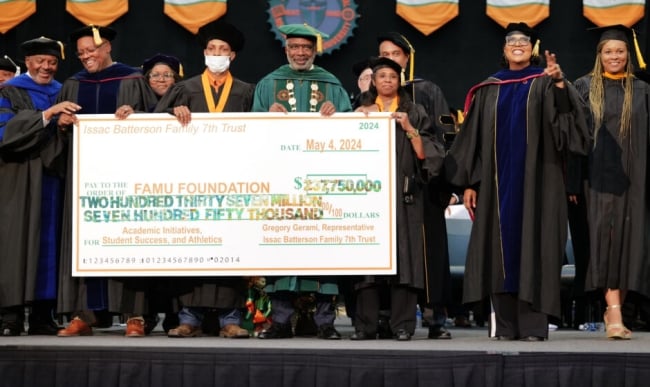You have /5 articles left.
Sign up for a free account or log in.

Gregory Gerami (center left, wearing a mask) presented Florida A&M University with a worthless $237 million donation at its graduation ceremony in May, according to a third-party investigation.
Florida A&M University
The largest donation Florida Agricultural and Mechanical University ever received is “fraudulent” and the donor’s valuation of the gift was “baseless,” according to a third-party investigation by Pennsylvania-based law firm Buchanan Ingersoll & Rooney PC.
The 176-page report the firm released this week confirms months of widespread skepticism that donor Gregory Gerami is an impostor: When the little-known but purportedly wealthy young hemp farmer from Texas presented a $237 million check to FAMU’s now-resigned president, Larry Robinson, at the university’s commencement ceremony in May, the spectacle set off a maelstrom of scrutiny.
In the days following commencement, Robinson paused the gift, which has since been canceled. The FAMU Board of Trustees also commissioned the investigation after some members said they didn’t know about the donation ahead of the public announcement.
Many of the trustees, as well as members of the FAMU Foundation, were also surprised to learn that the small group of leaders who did know about the gift ahead of time—including Robinson and Shawnta Friday-Stroud, who has since also resigned as FAMU’s vice president for university advancement and executive director of the foundation—hadn’t independently appraised the gift that Gerami transferred in the form of privately held stock.
To find out more about what led FAMU to accept Gerami’s dubious donation, the law firm spent the summer reviewing messages and other documents related to the donation, in addition to interviewing more than a dozen sources—even Gerami himself.
‘Pressured Not to Ask Questions’
While the investigation found that Gerami’s business career has been marked by “fraudulent activities, manipulative tactics and a web of deceit that entrapped investors and associates,” it also cited a breakdown in FAMU’s leadership and recommended that the university adopt clearer, more stringent guidelines for evaluating and accepting large gifts. It further advised FAMU to reorganize aspects of its governance structure.
Not having such guardrails in place allowed Robinson and Friday-Stroud to create “an environment where those involved felt pressured not to ask questions, to assume that proper due diligence had been performed, and to avoid seeking outside advice,” the report said. “This atmosphere of implicit trust in leadership’s judgment and directives contributed significantly to the acceptance of the fraudulent gift without adequate scrutiny.”
After Gerami approached the university about a potential multimillion-dollar donation last fall, Robinson reportedly told his staff “not to mess this up” and influenced those involved “to continue moving forward despite the existence of derogatory information about the donor.”
That derogatory information included newspaper reports that Gerami had abruptly backed out of a $95 million gift to Coastal Carolina University in 2020, his scattered and amateur online presence, and limited information about his company, Batterson Farms Corporation.
Despite Gerami’s “grand ambition” to become a wealthy businessman, his “portrayal of success has been maintained through deceptive practices designed to defraud investors and secure substantial financial support,” the report said. “Detailed accounts provided by former associates,” however, “offer a comprehensive view of how Mr. Gerami orchestrated these schemes, manipulated financial contributions, and leveraged purported university partnerships to create a façade of credibility for his operations.”
In addition to FAMU and Coastal Carolina, Gerami also contacted several other institutions about making big donations, including the University of Mississippi, Miles College and the University of Texas at Austin, though none of those offers moved forward, the report said.
Gerami’s association with higher education “was intended to enhance his credibility, as aligning with respected universities would make his businesses appear more legitimate and trustworthy, thereby reassuring his investors, while attracting additional financial support,” the investigation found. “Additionally, investors and other potential stakeholders might be more inclined to trust someone perceived as a benefactor to educational institutions, under the assumption that such an individual would be less likely to engage in fraudulent activities.”
Robinson has previously said he “wanted [the gift] to be real and ignored the warning signs along the way.”
Kristin Harper, the FAMU board chair who signed her name to the original gift agreement with Gerami, said in a statement that the board doesn’t “take this lightly” and is set to discuss the report’s finding at a meeting Thursday.
Gerami said in an interview with Inside Higher Ed that the “report is wrong,” but he admitted he hadn’t read the document in its entirety.
“The company is not baseless, the stock is not baseless,” he said. “We went through a third-party valuation. I didn’t see anything in that document that disputed the third-party valuation.”
The report acknowledged that Gerami in June gave the FAMU Foundation the results of a third-party valuation from a company called Stonebridge Advisors showing that the shares of private stock he gifted were worth $9.93 per share, a decline from the $15-per-share value he previously reported.
Yet the report also said Gerami only provided the first two pages of that valuation and “refused to provide any underlying documents submitted to Stonebridge.”
The Tallahassee Democrat first reported on the investigation.
‘A Unicorn’
FAMU has cut ties with Gerami as it attempts to rebound from this debacle, which at first seemed like another in a series of legitimate, historic philanthropic donations to HBCUs in recent years. In January, Spelman College received $100 million, the largest single donation ever given to an HBCU—a record FAMU has previously said Gerami wanted to top. And just this week, Bloomberg Philanthropies said it would donate $600 million to strengthen the endowments of four historically Black medical schools.
Walter Kimbrough, interim president of Talladega College in Alabama and an expert on HBCUs, said he’s not sure why FAMU’s leadership didn’t do its due diligence to validate Gerami’s gift, wondering if “everyone got caught up in the moment and wanted to believe it so badly that they just threw caution to the wind.”
Still, he described FAMU’s oversight—or lack thereof—as “a unicorn,” rather than as a contagious risk for historically underfunded HBCUs. “I don’t think that condition has created people that are so desperate that they’ll be gullible.”




